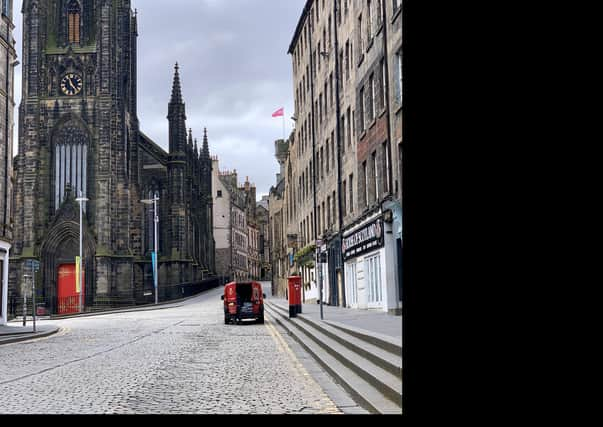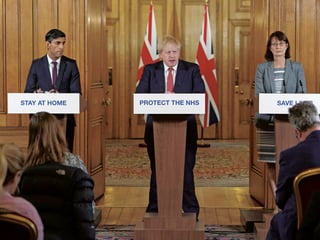Alexander McCall Smith: Coronavirus provides a fresh perspective on life


We shall shortly be two weeks into a period of national seclusion – a period in which the life of just about everybody has undergone profound change. A short time ago we would never have imagined that most of us would be confined to our homes, told not to meet friends and family, able to go out only for the most essential purposes. Only a few weeks ago who would have imagined the empty airports and railways stations, the deserted streets, the road-blocks preventing access to the countryside? The prescient would, of course, but they are never listened to. Virologists and epidemiologists have been warning about pandemics for years, but have been considered to be Cassandras. That is one of the things that has definitely changed: more attention is likely to be paid to them in the future.
Of course, there have been times when people have endured far worse than this, even in the comparatively recent past. The siege of Leningrad lasted 900 days, marked by privations beyond our current imagination. India and Africa have seen periods of famine at various points in the 20th century. And the depth of suffering of many in Syria over the last few years appears of a completely different order of magnitude when viewed alongside the relatively light inconveniences we have been subjected to. So, by any standards, we are not badly off at all, and might remind ourselves of that. And yet the contemplation of the greater toothache of others does little to relieve one’s own toothache.
Advertisement
Hide AdAdvertisement
Hide AdSocial psychologists will have a field day once this crisis is over. They are already hard at work, drawing our attention to the effects of loneliness and isolation. We have been warned of the psychological consequences of being cooped up with family for long periods – and these, we are warned, can be negative. At the same time, we are encouraged by news of the spirit of camaraderie that has brought people together in the shared project of helping one another and showing concern for the vulnerable. Even politicians who normally have no kind words for those of a different persuasion from themselves seem to have abandoned insults and belittlements in favour of a lexicon of co-operation and concord. Together is a re-discovered key word – a tame English-language counterpart of the lovely Swahili term harambee, which means, roughly, let’s all do this together.
Like many, my predominant emotion on the outset of this closing down of the country was a feeling of sadness. I felt sadness not for any personal inconvenience, but for the lives of others that were being so uncomfortably affected. There is a term for that feeling – one coined by Professor Glenn Albrecht, an Australian environmental philosopher – solastalgia. That is the feeling you get when the shape of the world about you changes too quickly. You lose your bearings; you become sad for what you have lost. Solastalgia is not nostalgia, although it may share some features. Solastalgia, I think, is what many of us are now feeling.
A poem I wrote about this was broadcast by the BBC and published online. Many people wrote to me about it from unexpected quarters. People want to believe that something better will come from what we are going through. I think we need to believe they are right, because believing in something is a powerful way of making it happen. It doesn’t always work that way, but sometimes it does.
Here is the poem:
In a time of distance
The unexpected always happens in the way
The unexpected has always occurred:
While we are doing something else,
While we are thinking of altogether
Different things – matters that events
Then show to be every bit as unimportant
As our human concerns so often are;
And then, with the unexpected upon us,
We look at one another with a sort of surprise;
How could things possibly turn out this way
When we are so competent, so pleased
With the elaborate systems we’ve created –
Networks and satellites, intelligent machines,
Pills for every eventuality – except this one?
And so we turn again to face one another
And discover those things
We had almost forgotten,
But that, mercifully, are still there:
Love and friendship, not just for those
To whom we are closest, but also for those
Whom we do not know and of whom
Perhaps we have in the past been frightened;
The words brother and sister, powerful still,
Are brought out, dusted down,
Found to be still capable of expressing
What we feel for others, that precise concern;
Joined together in adversity
We discover things we had put aside:
Old board games with obscure rules,
Books we had been meaning to read,
Letters we had intended to write,
Things we had thought we might say
But for which we never found the time;
And from these discoveries of self, of time,
There comes a new realisation
That we have been in too much of hurry,
That we have misused our fragile world,
That we have forgotten the claims of others
Who have been left behind;
We find that out in our seclusion,
In our silence; we commit ourselves afresh,
We look for a few bars of song
That we used to sing together,
A long time ago; we give what we can,
We wait, knowing that when this is over
A lot of us – not all perhaps – but most,
Will be slightly different people,
And our world, though diminished,
Will be much bigger, its beauty revealed afresh.
Comments
Want to join the conversation? Please or to comment on this article.
